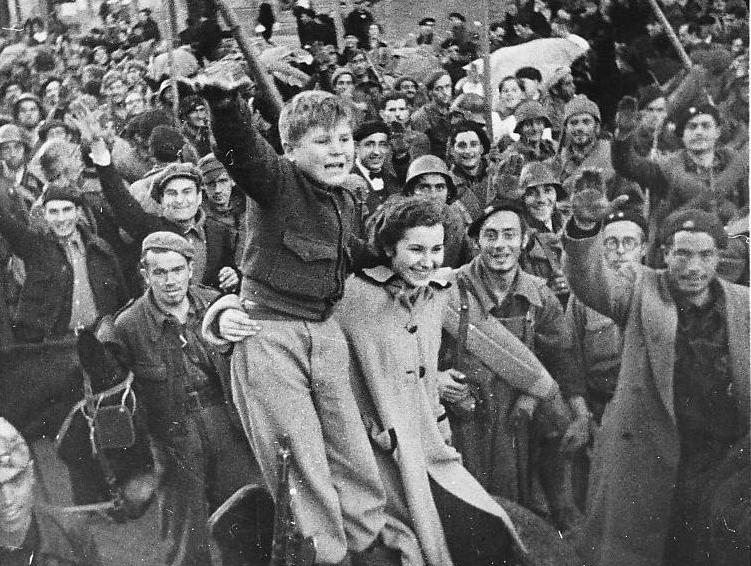
The Spanish Civil War: Nationalist Victory (1939)

Figure 1.--This press photo shows cheering Nationalists as the Franco's troops entered Barcelona, a Republican stronghold. The press caption read, "Cheers from the Young: Perched on a chair and supported by a smiling girl, this Barcelona ladcheered wildly as Insurgent soldiers entered Spain's largest city Jan. 26 in a triumphant climax to the two and a half-year old civil war."
|
|
Franco's Nationalists emerged a complete victors in the Civil War. Prime Minister Juan Negrín proposed at a meeting of the Cortes in Figueres, complete capitulation. The sole condition he proposed was that the lives of the defeated Republicans be spared. Negrín was deposed by Colonel Segismundo Casado, commander of the Republican oiffer. Casado accused the Prime Minister of seeking to turn over Spain to the Communists. This was essentially correct, although it ould only have been a gesture as the War was lost. Republican fighters realizing that the War was lost and that thy could expect no mercy at the hands of the Nationalists, began streaming into France as refugees. The Nationalists entered the Republican stronghold of Barcelona (January 26). All of Catalonia was in Nationalist hands (February 10). only Madrid and a few minor areas remained in Republican hands. British Primeme Minister Chamberlain and French Premier Daladier's governments recognized the Franco's Nationalist regime, before the official fall of the Republic (February 27). The last major city in Republican hands was Madrid. Peace proposals from the Junta de Defensa (under Casado and Besteiro) were futile as it was clear the Nationalists had won. The Spanish Communist Party (PCE) detrmined to resist to the end staged a mutiny in Madrid with the aim of re-enstalling Prime-Mimister Negrín's leadership, but Gen. José Miaja retained control. With the assistance of pro-Nationalist forces (what had become known as the Fith Column) Madrid finally fell. Franco's victorious army entered Madrid (March 28). The next day, Valencia which had been besiged for 2 years, also surrendered. , which had held out under the guns of the Nationalists for close to two years, also surrendered (March 29). Franco declared the Civil War officially over (April 1). Franco in a grandly staged ceremomy placed his sword upon the altar of a church and in a personal vow, promised that he would never again take up his sword unless Spain itself was invaded. President Roosevelt moved to lift the arms embargo (April 1). He then recognized the Franco Government (April 3, 1939). Roosevelt also removed the anti-Franco Claude Bowers, an old friend, as Ambassador. [Black, pp. 514-15.]
Sources
Black, Conrad. Franklin Roosevelt: Champion of Freedom (Public Affairs: New York, 2003), 1280p.
CIH

Navigate the CIH World War II Section:
[Return to Main Spanish Civil War page]
[Return to Main Spanish World War II page]
[Biographies]
[Campaigns]
[Children]
[Countries]
[Deciding factors]
[Diplomacy]
[Geo-political crisis]
[Economics]
[Home front]
[Intelligence]
[POWs]
[Resistance]
[Race]
[Refugees]
[Technology]
[Totalitarian powers]
[Bibliographies]
[Contributions]
[FAQs]
[Images]
[Links]
[Registration]
[Tools]
[Return to Main World War II page]
[Return to Main war essay page]
[Return to CIH Home page]
Created: 1:00 AM 4/15/2014
Last updated: 1:00 AM 4/15/2014



